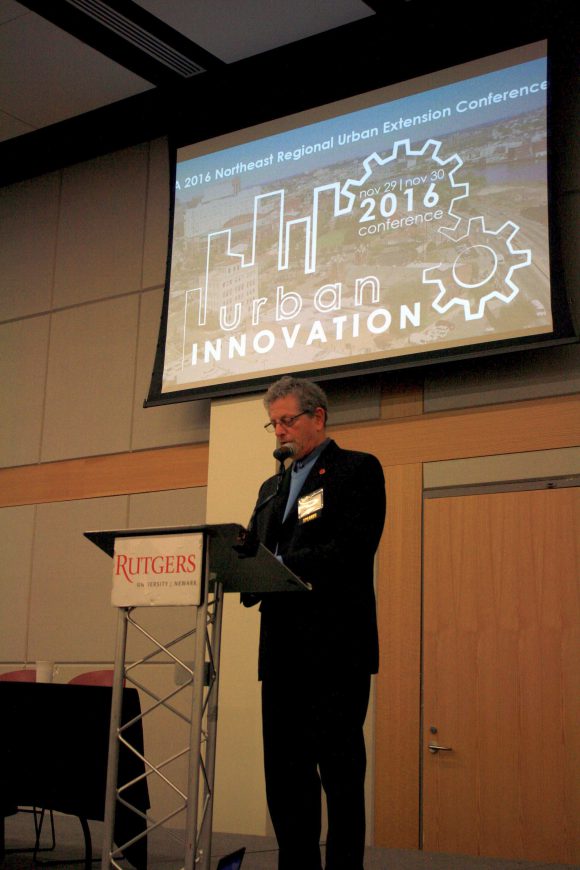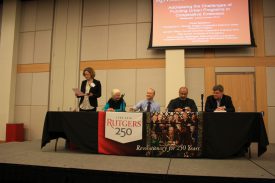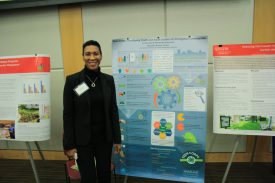
Opening remarks from Larry S. Katz, senior associate director, Rutgers New Jersey Agricultural Experiment Station, and director of Rutgers Cooperative Extension.
Rutgers Cooperative Extension and the Water Resources Program held the Northeast Regional Urban Extension Conference on November 29 and 30. The focus was on Urban Innovation: Building Collaborative Partnerships across University, Community, and Civic Leaders. Held at the Paul Robeson Center, Rutgers University-Newark, professionals from across disciplines of Cooperative Extension faculty, government officials and local stakeholders came together to highlight research and projects that are helping to build more resilient, sustainable, and healthy urban communities.
Welcoming the participants were Larry Katz, director of Rutgers Cooperative Extension, Robert Goodman, Executive Dean of Agriculture and Natural Resources in the School of Environmental and Biological Sciences, and Nancy Cantor, Chancellor of Rutgers University–Newark. All addressed the need for the university and Extension to collaborate with their communities and partners from all sectors of the economy in order prepare to embrace the future as urban areas face rapid change and to fulfill higher education’s promise as an engine of discovery, innovation, and social mobility.
More than 40 programs were selected for seminars to illustrate the impact Cooperative Extension is making in urban environments. Each seminar was aimed at addressing the opportunities to build collaborative partnerships, explore emerging urban issues, discover innovative technology for outreach, explore innovative funding practices and address the challenges of urban programming.
There were more than 132 attendees at the conference, including representatives from Cornell University, Michigan State University, Monmouth University, Ohio State University, Penn State, Pitzer College, Rutgers University, University of Connecticut, University of Delaware, University of Maryland, University of Rhode Island, University of the District of Columbia, Washington State University, West Virginia State University, and the WSU Metropolitan Center for Applied Research & Extension. Most attendees represented universities, but 12% were from the public sector, 11% were nonprofit organizations and 9% were from the private sector.

Panelists left to right Laura Lawson, Jennifer Tiffany, Brad Gaolach, Christopher C. Obropta, and Chester L. Arnold Jr.
Panelists included Laura Lawson, dean of agriculture and urban programs and professor of landscape architecture in the School of Environmental and Biological Sciences at Rutgers University; Jennifer Tiffany, executive director of Cornell University Cooperative Extension’s New York City Programs, director of Outreach and Community Engagement for the Bronfenbrenner Center for Translational Research (BCTR), and co-director of the Community Engagement in Research Component of Weill Cornell Medical College’s Clinical and Translational Sciences Center; Brad Gaolach, director of the Washington State University’s Metropolitan Center for Applied Research and Extension, director of the Wester Center for Metropolitan Extension and Research, and associate professor in the Department of Community and Economic Development at Washington State University; Christopher C. Obropta, director of the New Jersey Water Resources Research Institute, associate extension specialist in Water Resources at Rutgers Cooperative Extension, and associate professor at the Department of Environmental and Natural Resources at the School of Environmental and Biological Sciences at Rutgers University; Chester L. Arnold Jr., director of Outreach in the Center for Land Use Education and Research, and water quality educator in the Department of Extension at University of Connecticut; Kenneth Karamichael, associate director of the Office of Continuing Professional Education at Rutgers University; Jackie Davis-Manigaulte, senior extension associate of family program leader for Family and Youth Development and director of Community Relations with Cornell University Cooperative Extension in New York City; Michael Schwebel, community resilience and climate adaptation specialist at the Urban Coast Institute at Monmouth University and the New Jersey Sea Grant Consortium (NJSGC); and Sara Nolan, grants coordinator in the Office of Continuing Professional Education at Rutgers University.

Manami Brown, city extension director for University of Maryland Extension, Baltimore City.
Attendees left the conference having forged new relationships across state boundaries with the hope that this conference will become an example for other states across the nation to follow to highlight the emerging needs of our urban communities.
Presentations and program are available on the conference website to download.

